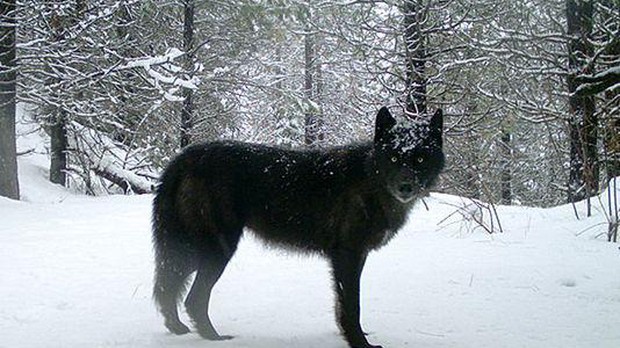
Today’s Northwest Wolves Have Roots In Coastal Rainforests And Rocky Mountains
New genetic research on the Northwest’s wolves finds they descended from a mix of two different types — some from the northern Rocky Mountains and some from coastal rain forests. That means the packs that form in our region have more genetic diversity — a key to survival.
The idea for this research actually started out with Oregon’s famous wandering wolf, OR-7. When Sarah Hendricks studied wolf DNA in the wake of OR-7’s travels, she and other researchers realized there are two genetically different types of wolves. And that got her wondering about wolves in Washington and Oregon.
Coastal rain forest wolves are pretty different from what we typically think of in Washington and Oregon.
“They eat a lot more salmon, as opposed to ungulates, like deer or elk. They’re slightly smaller. They have a different coat coloration. They’re fairly distinct from wolves we find in the interior parts of North America,” Hendricks said.
It turns out, the study found, some wolves in Washington have DNA signatures from coastal rain forest wolves, which, at some point, probably naturally migrated south and bred with wolves originally from the northern Rocky Mountains. They may have also moved into Washington. (Wolves in Oregon all appear to have northern Rocky Mountain DNA.)
The researchers were surprised to find DNA signatures from coastal populations show up in Washington.
“Most of the observational data indicates that individuals are coming from Idaho or Montana (which would be linked to northern Rocky Mountain DNA),” Hendricks said.
Hendricks, now a Ph.D. candidate at the University of Idaho, said it’s important for wolf packs to have genetic diversity.
“As populations and the environment changes in the future, it’s better to have a lot of genetic diversity so that the wolf populations can change as well,” she said.
Genetic diversity could be important as the climate changes, and wolves’ habitat and prey could be affected by increasing rain or temperatures.
Hendricks said it could also be important when people consider changes to public policy and species management. She said there needs to be more precise language for species with mixed DNA. For example, because of their mixed genes, these wolves are related to packs in Alaska — which could be important if wolves in Alaska are added to the Endangered Species List.
Copyright 2018 Earthfix
Related Stories:

Immigration enforcement concerns cause mixed attendance trends in North Central WA schools
Eastmont Junior High School students make their way past the 800 wing on the way to their second period in East Wenatchee. (Credit: Jacob Ford / Wenatchee World) Listen (Runtime

What’s fuzzy, cute and sold out? Chicks
As egg prices surge, baby chicks have been selling out across the region — and the country. (Credit: Susan Shain / NWPB) Listen (Runtime 3:59) Read The first person showed

Striking workers in Washington could get access to unemployment claims if bill passes
A proposed bill that would give striking workers some access to the state’s unemployment benefits is getting closer to becoming law in Washington.
Majority lawmakers in the House Committee on Labor & Workplace Standards moved the bill out of committee on Friday, with a recommendation to pass it. This, after the bill narrowly passed the senate with 28 yeas and 21 nays earlier this month.















